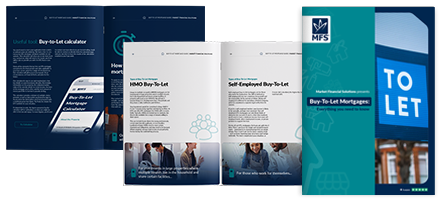Disclaimer
Market Financial Solutions are a bridging loan and buy-to-let mortgage provider, not financial advisors. Therefore, Investors are encouraged to seek professional advice. The information in this content is correct at time of writing.

What is a credit score, what’s affecting mine, and what is a “good” score?
A credit score determines your creditworthiness. In the UK, it’s a 3-digit number which indicates how reliable you are at borrowing and repaying funds. It ranges between 0 to nearly 1,000. Generally, the higher your number, the better your score.
Several elements of a person’s life and financial background go into determining a credit score. But, a few factors tend to have a bigger impact. Arguably, your payment history will be the single biggest element that’ll affect your score. Lenders will want to know that you consistently cover your debts. Missed payments in your history will pull your credit score down.
Frequently setting up new accounts or applying for credit too often may also lower your score. Being close to your credit limit – the maximum amount of money you can owe on a credit card – may also hit your creditworthiness. All of this could make lenders fear you’re too reliant on credit to get by.
You’ll need to keep track of how much you can afford to borrow too. If you can’t pay off your debts, you may end up facing debt relief orders, individual voluntary arrangements, county court judgements and the like.
Having any of these on your record will not only cut your score, they could also make the basics unobtainable. Some banks may not even allow you to open an account with them, if you have these kinds of problems in your background.
On the other hand, having little to no credit history at all can also lower your score. Lenders typically want to see a track record of timely repayments and sensible financial decisions. If there is not a lot to assess from the outset, it will be tricky to gauge how creditworthy you are.
While there are a lot of things that can affect a credit score, certain elements of your past will have no baring at all. Your score is only tied in with people you’re financially linked to. Spouses being an obvious example. So, this means family and friends you’ve lived with, but have no financial ties to, will not affect your score.
What’s more, credit reports generally only go back 6 years or so. This means missed credit card payment you might have from 15 years ago wouldn’t usually affect it.
Who provides credit scores?
Credit scores are provided by 3 main credit reference agencies in the UK. These are Experian, Equifax, and TransUnion. They collate data on your financial history and assign you a score, which lenders then use to determine if you’re creditworthy.
Broadly, these agencies assess the same kinds of elements. Including payment histories and how often credit is applied for. You can get a credit report from these agencies, which are free and do not impact your score.
Experian’s credit scores range between 0 to 999. Any number up to 560 is very poor. If you fall within this range, lenders will likely refuse most credit cards, loans, and mortgages. An excellent score sits between 961 and 999. This kind of score should grant you access to the best deals, but you need to remember there are no guarantees.
Equifax recently upgraded its scoring system, taking its maximum number from 700 to 1,000. TransUnion’s scores go up to 710. Your score will likely be similar across these three agencies. There may be slight differences between them, but what you need to remember is that the higher your number, the better your score is.
Source: Experian, Which?, TransUnion
What credit score do you need for a loan or mortgage?
Credit scores are not the only element when you apply for a loan or mortgage. Banks and lenders will use lending scores to support their decisions, but they’ll also have their own assessment processes. There’s no minimum credit score number that’s universally accepted across the industry. Individual lenders will determine their own thresholds.
Generally, the higher your score, the better deals you’ll find. If you are a ‘trustworthy’ borrower, you’ll likely be offered lower interest rates on the loans you’re applying for. It’s still possible to get a loan with a poor credit score, but deals may be harder to come across. They’ll likely be more expensive and less flexible.
If you have bad credit, mainstream lenders may only offer you a very limited selection of products. Typically secured loans, guarantor loans, and some personal loans are offered to those with poor credit histories.
Source: MoneySuperMarket

How will loan applications affect my credit score?
Loan applications usually involve a “hard” credit search. This will appear on your credit record and be visible to prospective lenders. But, lenders themselves do not report to credit reference agencies whether a loan application was successful or not. Despite this, hard searches will typically leave a small blip on your record.
Loan applications remain on a record for up to two years. Their impact can be erased, so long as you make sensible choices beyond the application. While a rejected application may not affect your record, how you react will.
Applying for multiple loans in a short space of time – which you may do if you keep on getting rejected – will have a negative impact on your record. Lenders will see these applications which may raise red flags.
If you’re investing in property, you may benefit from some credit perks. A mortgage agreement in principle, or decision in principle, allows buyers to understand how much they can borrow before applying. Fortunately, decisions in principle usually only involve soft credit checks. This means they shouldn’t turn up on your credit record.
Bad practices – what kind of actions will lower my score?
Aside from the obvious, such as missing payments, there are several actions you could take which may lower your credit score. It’s important to note them too. You may not realise they could be damaging.
Using credit cards for purchases, and then paying off the debt quickly, is a well-known way of boosting a score. However, you’ll need to be careful with this. Opening new credit cards will result in new hard checks, potentially pulling your score down.
If you have a lot of debt to your name, you may also think it’s worthwhile to get a debt consolidation loan. This is where debts from multiple accounts are brought into a single account. This could lead to simpler budgeting and lower rates. But it could also lead to lower credit scores.
More hard searches will be performed, while closing old accounts could unnerve certain lenders. Some companies want to see more mature forms of debt against your record. Also, your overall credit limit may drop, pushing your credit utilisation up.
When it comes to credit histories, there are no easy answers. Multiple elements are having an affect. You’ll need to not only focus on what you’ve done in the past, but also what you want to achieve in the future.
Good practices – how can I boost my score?
To boost your credit score, there are a few basic things you can do. If you pay off your debts, your scores should gradually improve. You should also regularly keep an eye on your credit reports. Mistakes can emerge and by rectifying them, you could protect your score.
Registering on your local electoral roll could also help. This allows lenders to verify your identity quickly and help combat identity fraud. It’s also worth cutting ties with people you’re financially connected to, where possible.
By taking these kinds of steps now, it could open financial doors for you down the line. To fully understand the options available to you, it is advisable to get guidance from a qualified financial adviser.
Source: Equifax
Where are credit scores heading, and how do we incorporate them?
It’s worth acting on improving your credit score where possible considering the current state of the economy. We’re facing a cost-of-living crisis and when an economy struggles, people tend to fall behind on their bills.
In 2022, just over 1 in 10 adults have missed an energy bill payment. Defaults are also on the rise, and there’s little respite on the horizon. Some 11 million households are at risk of falling into fuel poverty.
But as budgets are stretched, and credit ratings take a hit, specialist finance will be there to support the market. With our ability to remain flexible and adapt to a difficult climate, we are able to support your property investment plans. When assessing your claim, we will not focus on your credit score or less transparent “scorecard” measures to determine your eligibility.
We’ll explore information held within credit bureaus to assess your financial background. We believe this can help account for a broader set of circumstances. It allows us to be flexible in how we lend and what parameters we’ll fit you in to, to decide on an appropriate product.
We also have internal tools to gauge credit worthiness for property investment companies – both UK based and offshore. Additionally, we have systems in place to assist with AML and know-your-customer requirements. All of this allows our underwriters to get a much clearer picture of your situation and deliver a truly bespoke service. We look for reasons to lend, as opposed to finding excuses not to.
We have history on our side too. Between 2009 and 2021, specialised lenders increased their lending volumes by over 300%. Our industry expanded during the aftermath of the credit crunch, through Brexit negotiations, and in the middle of a global pandemic. If your credit score takes a hit over the coming months, we’ll still be more than willing to hear from you.
Source: Financial Reporter, The Times, Mortgage Solutions, Evening Standard, Mortgage Finance Gazette
The Complete Guide to
Buy-to-Let Mortgages
Everything you need to know
- Fundamentals
- Different mortgage types
- Useful tools
- Industry stats & more





